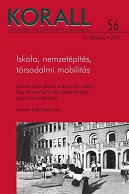A debreceni tudományegyetem református hittudományi kari tanárainak prozopográfiája és a református felekezeti-művelődési alakzat szociológiája
A Prosopography of the Professors of the faculty of Reformed Theology at the University of Debrecen and the Sociology of the reformed Confessional-edu
Author(s): I. Gábor KovácsSubject(s): History
Published by: KORALL Társadalomtörténeti Egyesület
Summary/Abstract: The study provides an analysis of entries on teachers of the Faculty of Reformed Theology in Debrecen recorded in the forthcoming prosopography database of all university teachers active in Hungary between 1848 and 1944. The family history of theology professors appointed in the first half of the twentieth century can be traced back two-three generations and often as far back as the eighteenth century. The main research question of the analysis is whether it is possible to use sociology to verify a previous hypothesis, which suggests that there is an organically developed confessional-educational structure behind the protestant segment of the intellectual elite of twentieth-century Hungary. Even a relatively small sample of twenty individuals was sufficient to demonstrate the continuity of this formation from the eighteenth century onwards. Its core comprised of a clerical order similar to the German Pfarrhaus, complemented by other elements such as teachers, primary teachers, notaries or rural administrators who were all part of a complex web with close ties to the landed gentry. Although priesthood as a profession was passed on from generation to generation, which resulted in the birth of preacher dynasties, the continuity of the formation was mostly maintained by the constant addition of further individuals and families. At the same time, despite its internal movements, the pool that provided the supply of newcomers can be characterised as relatively constant. This pool consisted of upwardly mobile protestant members of nobility, non-aristocratic small-holders, craftsmen, aristocratic and honoratior intellectuals, and smallholder noblemen of Hungarian ethnicity. The concept of this protestant Hungarian confessional-educational formation can only be analysed together with this supply pool, as well as the whole ecclesiastical and educational institutional framework, which controlled not only the process of supply but the denominational block as a whole.
Journal: Korall - Társadalomtörténeti folyóirat
- Issue Year: 2014
- Issue No: 56
- Page Range: 46-68
- Page Count: 23
- Language: Hungarian

